Update Customer Affinities
1. updateCustomerAffinities.cs
These four packages are required to be used.

Step 1. Create class file to store content of the web response.
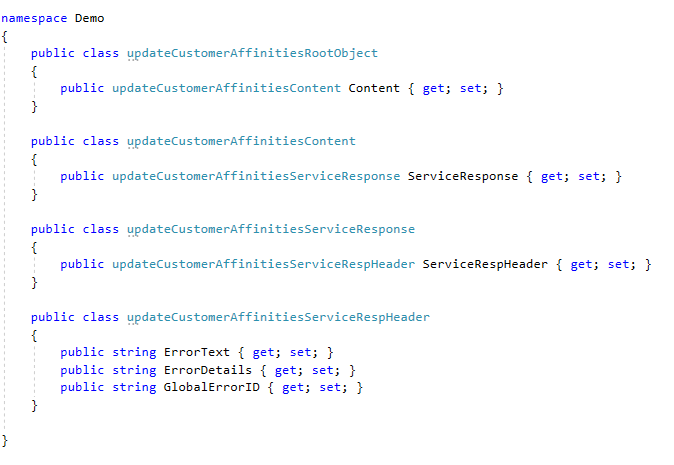
2. updateCustomerAffinities.aspx.cs
These 13 packages are required to be used.

Code in Common
(1). Create an Affinitiy1 ListObject Variable. Check if user id and password is inside session. When the user id and password is inside user session, it will automatically populate into the user id and pin textbox, so that the user need not manually type his user id and password repeatedly.
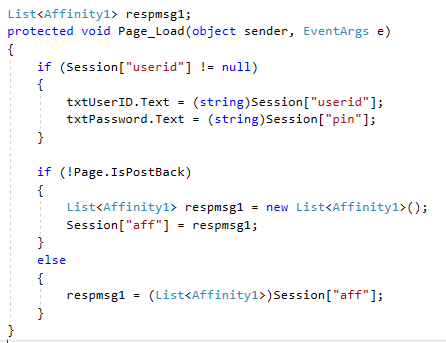
Step 2. "Add" Button. This would allow user to update more than one AffinityID before clicking the send button together with other inputs.
When the add button is clicked, an array which consist of AffinityID and Active would be added to the resmsg1 List.

Step3. Clear Button. When the clear button is clicked, the label, affinityID and Active textbox would be cleared.

Step 4. Send Button. Store details entered by the user. If user id, password, and OTP exist in session, user need not enter again (refer to common stuff).
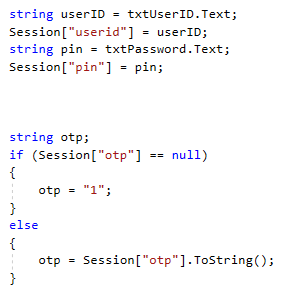
Step 5. Create URL which will be post to the server. User inputs need to be stored in the class created, and serialize into JSON format. In this function, both header and content are needed.
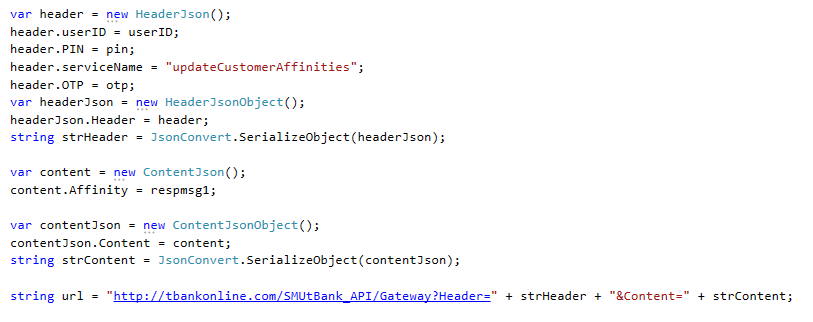
Step 6. Post to the server, and store response. URL is sent using web request function, and a response will be send back from the server. The response need to be deserialized into the ‘updateCustomerAffinities' class.
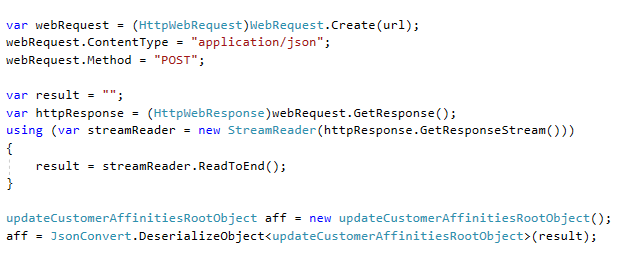
Step 7. Obtain error code. If error code is ‘010000’ which means invocation successful, populate attributes of the ‘updateCustomerAffinities'’ class into the Label. If error code is '010041', it means OTP has expired, and we will use the newOTP() function to prompt the user for the OTP again. Else, we will display the ErrorText and ErrorDetails.
The newOTP() function can be referred to under Common Stuff Section
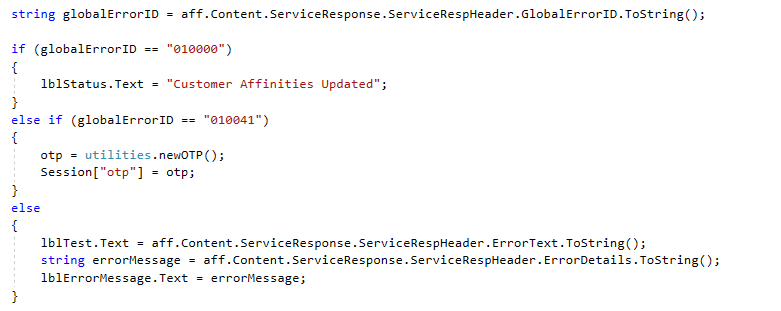
Overview of updateCustomerAffinities.cs
using System;
using System.Collections.Generic;
using System.Linq;
using System.Web;
namespace Demo
{
public class updateCustomerAffinitiesRootObject
{
public updateCustomerAffinitiesContent Content { get; set; }
}
public class updateCustomerAffinitiesContent
{
public updateCustomerAffinitiesServiceResponse ServiceResponse { get; set; }
}
public class updateCustomerAffinitiesServiceResponse
{
public updateCustomerAffinitiesServiceRespHeader ServiceRespHeader { get; set; }
}
public class updateCustomerAffinitiesServiceRespHeader
{
public string ErrorText { get; set; }
public string ErrorDetails { get; set; }
public string GlobalErrorID { get; set; }
}
}
Overview of updateCustomerAffinities.aspx.cs
using System;
using System.Collections.Generic;
using System.Linq;
using System.Web;
using System.Web.UI;
using System.Web.UI.WebControls;
using DotNetOpenAuth.OAuth2;
using Newtonsoft.Json;
using System.Collections.Specialized;
using System.Configuration;
using System.Net;
using System.IO;
using System.Windows.Forms;
namespace Demo
{
public partial class UpdateCustomerAffinities : System.Web.UI.Page
{
List<Affinity1> respmsg1;
protected void Page_Load(object sender, EventArgs e)
{
if (Session["userid"] != null)
{
txtUserID.Text = (string)Session["userid"];
txtPassword.Text = (string)Session["pin"];
}
if (!Page.IsPostBack)
{
List<Affinity1> respmsg1 = new List<Affinity1>();
Session["aff"] = respmsg1;
}
else
{
respmsg1 = (List<Affinity1>)Session["aff"];
}
}
protected void btnSend_Click(object sender, EventArgs e)
{
if (Page.IsValid)
{
try
{
string userID = txtUserID.Text;
Session["userid"] = userID;
string pin = txtPassword.Text;
Session["pin"] = pin;
string otp;
if (Session["otp"] == null)
{
otp = "1";
}
else
{
otp = Session["otp"].ToString();
}
var header = new HeaderJson();
header.userID = userID;
header.PIN = pin;
header.serviceName = "updateCustomerAffinities";
header.OTP = otp;
var headerJson = new HeaderJsonObject();
headerJson.Header = header;
string strHeader = JsonConvert.SerializeObject(headerJson);
var content = new ContentJson();
content.Affinity = respmsg1;
var contentJson = new ContentJsonObject();
contentJson.Content = content;
string strContent = JsonConvert.SerializeObject(contentJson);
string url = "http://tbankonline.com/SMUtBank_API/Gateway?Header=" + strHeader + "&Content=" + strContent;
var webRequest = (HttpWebRequest)WebRequest.Create(url);
webRequest.ContentType = "application/json";
webRequest.Method = "POST";
var result = "";
var httpResponse = (HttpWebResponse)webRequest.GetResponse();
using (var streamReader = new StreamReader(httpResponse.GetResponseStream()))
{
result = streamReader.ReadToEnd();
}
updateCustomerAffinitiesRootObject aff = new updateCustomerAffinitiesRootObject();
aff = JsonConvert.DeserializeObject<updateCustomerAffinitiesRootObject>(result);
string globalErrorID = aff.Content.ServiceResponse.ServiceRespHeader.GlobalErrorID.ToString();
if (globalErrorID == "010000")
{
lblStatus.Text = "Customer Affinities Updated";
}
else if (globalErrorID == "010041")
{
otp = utilities.newOTP();
Session["otp"] = otp;
}
else
{
lblTest.Text = aff.Content.ServiceResponse.ServiceRespHeader.ErrorText.ToString();
string errorMessage = aff.Content.ServiceResponse.ServiceRespHeader.ErrorDetails.ToString();
lblErrorMessage.Text = errorMessage;
}
}
catch (Exception ex)
{
lblExceptionMsg.Text = ex.ToString();
}
}
}
protected void btnAdd_Click(object sender, EventArgs e)
{
lblAdd.Text = "";
string AffinityID1 = txtAffinityID.Text;
string Active1 = txtActive.Text;
respmsg1.Add(new Affinity1 { AffinityID = AffinityID1, Active = Active1 });
lblAdd.Text = "Added";
}
protected void btnClear_Click(object sender, EventArgs e)
{
lblAdd.Text = "";
txtAffinityID.Text = "";
txtActive.Text = "";
}
}
}
Created with the Personal Edition of HelpNDoc: Full-featured Documentation generator